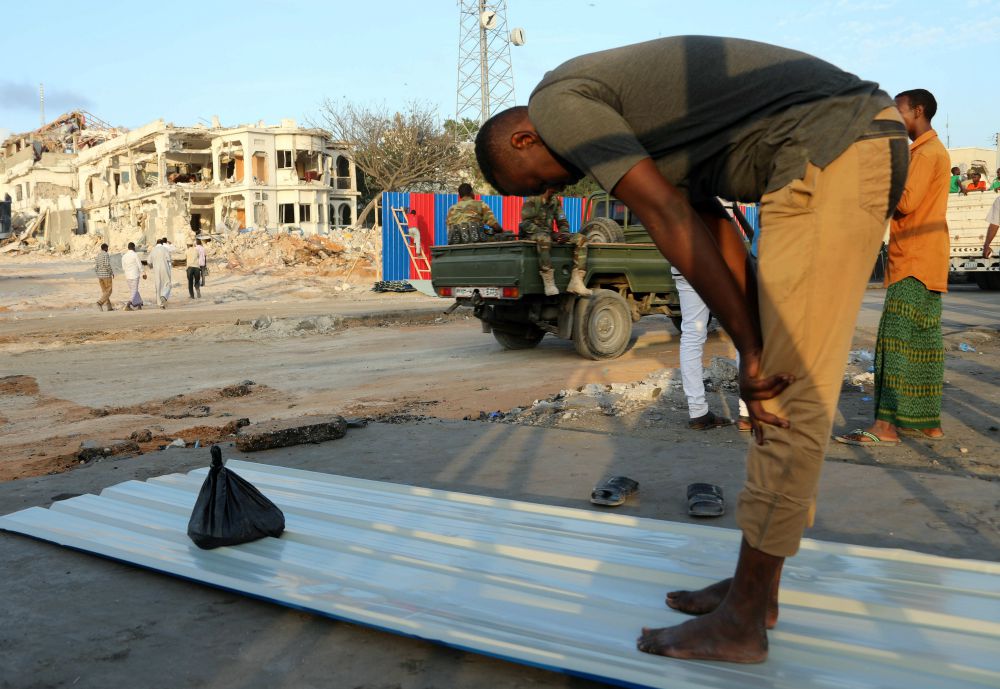
A volunteer prays Oct. 17, 2017, at the scene of an explosion in Mogadishu, Somalia. The Oct. 14 attack caused more than 300 deaths, including several children." (CNS/Reuters/Feisal Omar)
"It sounds like something from a horror movie, but they have scars on their body to prove it," said Patrice Lawrence, national policy and advocacy director for UndocuBlack Network, as she described Somalis' stories of kidnapping, forced recruitment and torture at the hands of militants in their home country.
As Somalia experiences what the U.N. has called the worst humanitarian crisis in the nation's history, approximately 500 Somalis have been granted at least 18 more months in the U.S. after Secretary of Homeland Security Kirstjen Nielsen opted to renew the country's temporary protected status July 19.
But the administration ignored without explanation advocates' calls that the country be redesignated for the status, which would have pushed up the required arrival date for applicants, currently September 2012, to near the present and made an estimated 1,000 additional Somalis eligible for protection.
"Given the conditions in Somalia, it is absolutely unconscionable to not grant the maximum protection under the law," said Lisa Parisio, advocacy attorney for the Catholic Legal Immigration Network (CLINIC). " … It is an active choice not to protect people while simultaneously, through the extension, laying out just how bad the conditions are in Somalia and that lives would be at risk for people to return."
Temporary protected status is offered to immigrants who would otherwise be undocumented, but come from countries experiencing violent conflict, natural disasters or other extreme conditions that make them too dangerous to receive returning immigrants. It allows beneficiaries to work legally and be protected from deportation as long as their country's status continues to be renewed, but offers no path to permanent legal status.
The status can be renewed as many times as necessary if conditions persist, but only in increments of six, 12 or 18 months. Most recently renewed shortly before President Donald Trump's inauguration, Somalia's status is the last to be reviewed of the 10 countries that were protected when the current administration came into power.
Somalia is currently suffering from violence caused by militant group Al Shabaab and other factions that target civilians, said Parisio, who added that 1.5 million people are displaced. The deadliest attack on civilians in the nation's history, a truck bomb that killed hundreds, took place less than a year ago.
Advertisement
The country is also suffering a food and health care crisis, with 2.5 million in need of emergency food assistance and people dying of preventable diseases, Parisio said. Flooding in the capital city of Mogadishu has also put people at risk, Lawrence added.
Somalia was originally granted temporary protected status in September 1991, meaning some temporary protected status holders could have had the status for almost 27 years, but it has twice been redesignated to allow more recent arrivals to apply.
Conditions in Somalia are "significantly worse" than when the status was most recently redesignated in September 2012, Lawrence said. "If we're looking at it from the space of country conditions and not politics, it doesn't make sense that you wouldn't redesignate for them."
The African country is one of four, including Yemen, Syria and South Sudan, that had their status renewed, while six — El Salvador, Honduras, Nepal, Haiti, Sudan and Nicaragua — will see their status permanently expire in the coming months.
The vast majority of temporary protected status holders come from El Salvador (195,000), Honduras (57,000) and Haiti (46,000), while the groups that had their status renewed were relatively small — 70 migrants from South Sudan to a group of 7,000 Syrians. Over 97 percent of those who were protected will lose their status between Nov. 2, 2018, and Jan. 5, 2019.
Renewal and redesignation
CLINIC advocated for renewal for all 10 countries, Parisio said, arguing that there was a legal basis to do so in each case. She added that there is no clear pattern in the administration's decisions, but noted that the countries that are still protected were designated for "ongoing armed conflict" while only one that had its status cancelled, Sudan, was designated for that reason.
CLINIC also advocated for redesignation in the case of Honduras because of escalating unrest and political crisis and in the cases of Syria, Yemen and Somalia because of continued violence and other extreme conditions in those countries. The administration has not redesignated any countries and has not offered an explanation for its failure to do so, one of the reasons CLINIC is calling for congressional oversight to hold the administration accountable, Parisio said.
She added that CLINIC plans to reach out to people who are losing status to provide assistance with screenings for pathways to legal residence. CLINC will also help decide what to do about U.S. homes, mortgages and bank accounts, as well as the "heart wrenching situation" of the hundreds of thousands of U.S. citizen children of status holders who will have to remain in the U.S. without their parents or return with them to dangerous countries.
Somali status holders, who can at least temporarily relax about their personal situations, will also be stepping in to raise public awareness about others who are not protected or will soon lose status, Lawrence said.
If possible, they would like to see a legislative solution protecting all who are or have been covered by the program, including migrants from Guinea, Liberia and Sierra Leone who lost protection during the Obama administration. (Liberians had continued to be covered by a similar program, Deferred Enforced Departure, until Trump ended that protection effective March 2019.)
"Somali TPS holders see this as an opportunity to really help others," Lawrence said. "They want to make their voice heard. … They really want a solution for the people from all those 13 countries."
[Maria Benevento is an NCR Bertelsen intern. Her email address is mbenevento@ncronline.org.]








